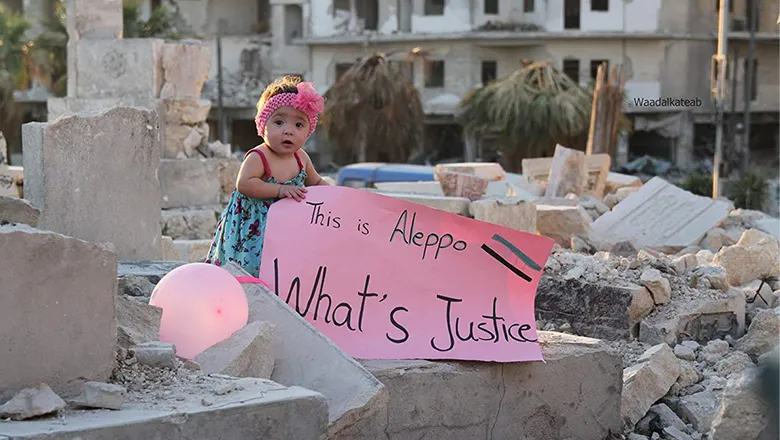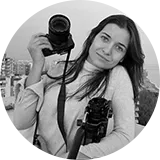“I was terrified of losing the baby as much as I was scared of giving birth inside the siege”
Waad Al-Kateab, Journalist and Oscar-nominated documentary filmmaker
14 March 2023
Parenting in a warzone
Waad Al-Kateab
Waad Al-Kateab is a journalist, activist and filmmaker. This essay tells the powerful story behind her Oscar-winning documentary, For Sama


Waad Al-Kateab is a journalist and Oscar-nominated documentary filmmaker.
This essay is taken from our new edition of Essays on Equality: The politics of childcare. Read the full collection here.
I found out I was pregnant with Taima, my second daughter, in mid-September 2016. At that time, my home – East Aleppo – had been besieged for 62 days by the Assad regime forces, and their Russian and Iranian allies. We did not know how long the siege would last, nor whether we’d survive it. Death was a daily occurrence, and basic goods such as fruit, vegetables, baby milk and even medicine were not available. We were completely cut off from the rest of the world.
I remember that I started waking up feeling sick, and weak. I thought it was my body's reaction to the lack of vitamins and fresh food. After all, we could only eat pasta or rice every single day. But then a nurse looked at me weirdly and said, “You look like a pregnant woman. Are you hiding any good news?” Her words came to me like a shock. I started thinking about my morning sickness, and I knew it: I am pregnant.
Just a few minutes later, I went downstairs to the midwife who confirmed it through the ultrasound, and I rushed, crying to Hamza – my husband, who was a doctor and the manager of the hospital where we were living. I started throwing so many questions at him: Why has this happened now? What should I do? How can I protect the baby? How can I feed the baby when I am not able to protect nor feed our first, Sama, who is six months now? I cannot even protect nor feed myself!
As the days passed, every single second was a challenge. The shelling was relentless as the regime, supported by Russian forces, escalated its military operations and started taking over more areas. The siege was closing in tighter on us, and I often thought we would not survive it. I was terrified of losing the baby as much as I was scared of giving birth inside the siege.
Then, in December 2016, it all came to an end with a scenario we had never expected, nor wanted: forced displacement. It crushed us, and we were in shock – with no time to really understand what was about to happen to us, nor to say our goodbyes to anything properly.
I was, however, able to go to my house – the first home my husband and I created as a family. I cried all my tears there as I remembered how five years earlier I was standing with hundreds of students in Aleppo university, chanting for freedom. What followed was a systematic strategy of annihilation put forth by the Assad regime: cluster bombs, barrel bombs, chemicals – everything was used to destroy the areas outside of its control, and the people in there that stood up for dignity. The siege and its “surrender or starve” policy had hit other Syrian cities before ours (and others have followed later), resulting in population transfers that were labelled as “evacuations”. And now our home, the places we were fond of, our friends buried there, our whole life and memories were being taken away from us. I did not want to leave but we were not given a choice.
“I often stand at the door of my daughters’ bedroom now, watching them as they sleep… and I cannot help thinking of the blessing of such a simple moment, after all we have been through”
Waad Al-Kateab, Journalist and Oscar-nominated documentary filmmaker
Hamza, Sama and I survived, even though the trauma was so deep that it reduced any other pain as trivial. Yet, five months after our displacement I felt I was able to restore something so immense and precious inside of me, when my beautiful baby, Taima, was born, safe and healthy, even though in exile.
As with every Syrian baby who was born in Turkey, she had no formal paper and the only one I had was from the hospital, stating the birth of a healthy girl – albeit nameless. We put enormous effort into trying to register her at the Syrian embassy in Istanbul, and back in Syria through a lawyer, and other ways too. But there was no luck due the Assad regime demanding us to go back to Syria to do it in person, which was impossible for us – if we were to go, they would have easily arrested us, or killed us directly.
Taima was only one year old when we had to leave her in Turkey, while Hamza, Sama and I left for the UK to apply for asylum. Once again, we were in a situation where every choice meant heartbreak and, at the same time, it didn’t even feel like we had an actual choice at all. It took five months to be able to reunite with her and finally have her back with us in the new home that we were starting to create.
I often stand at the door of my daughters’ bedroom now, watching them as they sleep – like angels, peacefully – and I cannot help thinking of the blessing of such a simple moment, after all we have been through. And how much responsibility I have: to carry on and to keep telling the world about what happened to us and what has not ceased to happen to others. When my documentary, For Sama, was released, the reaction from the public was astonishing. People’s emotions paved the way for understanding, solidarity and a sincere desire to do something about it: “What can we do?” they’d ask, as the lights would go back on in theatres.
Action for Sama, the impact campaign that my husband and I founded shortly after, carries our efforts toward an answer to that question. The campaign calls for accountability for the war crimes committed in Syria and fosters a deeper understanding of the events that caused millions to flee, told by the ones who lived them. It is also a way for everyone who wishes to stand by us, and support our fight for a different, brighter future – for my daughters and all the Syrian children, for all of us who still dream to go back to a free Syria, one day.
